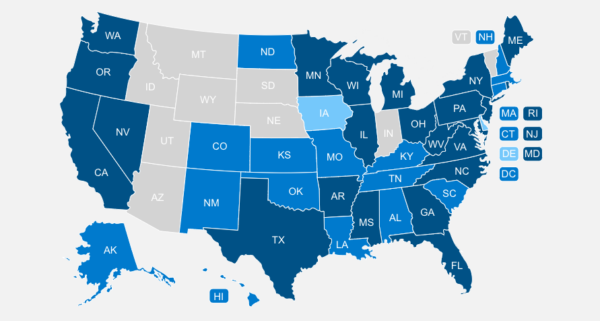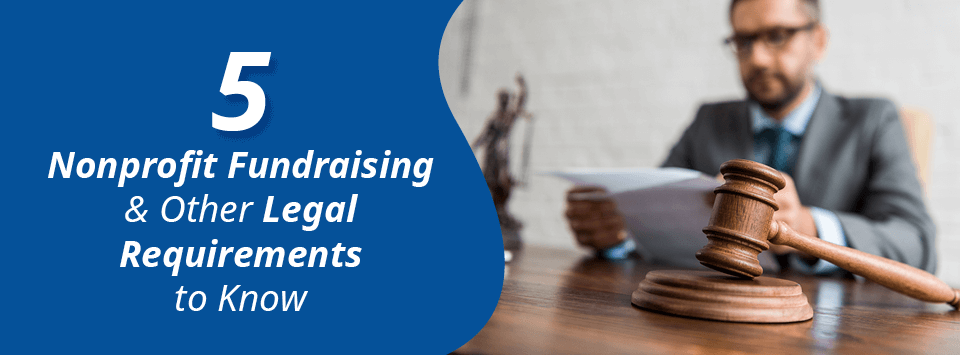Donor Privacy Is At Stake
February 4, 2021American Rescue Plan Act Relief For Nonprofits
March 16, 2021Nonprofit State Filing Requirements: Complete Overview

Nonprofit State Filing Requirements: Complete Overview

If you’ve already started a nonprofit, completed your Form 1023, and received tax-exempt 501(c) status from the IRS, you’ve handled one part of the compliance equation. The other critical part of nonprofit compliance involves navigating the various state-level regulations that are relevant to your operations.
Nonprofit state filing requirements can be complex, as the exact forms and deadlines involved can change over time and vary greatly by jurisdiction.
It’s complicated, but there’s no way around due diligence. Nonprofits need to be responsible stewards of their donors’ gifts, and ethical fundraising at all regulatory levels is simply part of running an effective, well-regarded organization. Besides, the legal and reputational headache of neglecting state-level compliance is something you definitely want to avoid.
In other words, complying with all nonprofit state filing requirements is mission-critical.
While the regulatory landscape is complex, you don’t have to be an attorney or nonprofit CPA to understand it (although their expertise is certainly helpful). Start by mastering the different types of requirements and documentation that will come into play for your nonprofit. We’ve put together this overview of the essentials:
- Fundraising Filing Requirements
- Annual Corporate Requirements
- Annual Financial Returns
- State Tax Exemption
For over 30 years, the experts here at Labyrinth have worked with thousands of organizations to help them meet the appropriate requirements and stay focused on their missions, not paperwork. We know firsthand just how important state filing requirements are, so whether you’re new to the nonprofit world or just looking for a refresher, we’ve got you covered.
Nonprofit State Filing Requirements for Fundraising
A majority of states require your nonprofit to register with their Attorney General or Secretary of State office before you can legally solicit donations from the state’s residents. This process is often referred to as charitable solicitation registration, and it typically must be completed before you can begin actively fundraising in those states.
The particular regulations around charitable solicitations differ between each state and should be researched long before you begin rolling out your next fundraising campaign. Use our directory of state fundraising registration requirements to learn more about the specifics for each state.
However, there are plenty of commonalities between each state’s approach to fundraising filing requirements. Here are a few regulatory elements that you’ll encounter in every state:
- Fees. When you register to fundraise in a state, you’ll typically pay an initial registration fee, followed by regular renewal fees for as long you’re actively operating in that state. Filing fees vary by jurisdiction and can change based on your nonprofit’s total gross revenue from the past year. For example, Missouri’s initial filing and renewal fees are a flat $15, while Ohio’s initial filing and renewal fees are calculated on a scale up to $200.
- Types of documentation required. The exact documentation required to satisfy state-level fundraising filing requirements can vary, but there are a few essentials that you should generally always prepare. These include your IRS Form 990, a copy of your bylaws, your Articles of Incorporation, your IRS Letter of Determination, financial statements, and any contracts with third-party fundraising professionals.
- Penalties. Failing to register with a state before soliciting donations can lead to a range of penalties. Missed filing deadlines can result in late fees, sometimes quite hefty. Failure to register at all can even result in civil and/or criminal charges in some cases.
- Renewal. Most states require nonprofits to renew their charitable solicitation registrations each year. There are a few exceptions and variations, though, so double-check the relevant requirements for your operations. For instance, Georgia and the District of Columbia require renewals every two years rather than annually.
For a deeper dive into the charitable solicitation registration process, including explanations of common penalties and the types of documents typically needed, explore our complete compliance guide.
When in doubt, you can find the most up-to-date information on fundraising filing requirements on the website of each state’s Attorney General or Secretary of State office. However, remember that these requirements can frequently change, making staying on top of them uniquely challenging for nonprofits that operate in multiple states. This is why many organizations turn to professionals to manage the process and maintain renewals on an ongoing basis.
Annual Corporate State Filing Requirements for Nonprofits
In addition to registering to fundraise in the different states where your nonprofit is active, you often need to register in order to more generally conduct business there, as well.
Nonprofits that are incorporated or registered to conduct business in a state are required to file an initial corporate report and then renew it on a regular basis. This report is typically required annually or biennially, although there are a few states that offer longer timeframes. Unlike the fundraising registrations described above, nonprofits only need to complete annual corporate state filings in a handful of states. These include:
- The state where the nonprofit is incorporated
- States where the nonprofit has paid staff
- North Dakota and the District of Columbia, if the nonprofit is registered to fundraise in those jurisdictions
In addition, note that annual corporate filings are not required in a few states:
- Alabama
- Mississippi (although a status report is required every five years or whenever there is a change in the organization’s information)
- South Carolina
- North Carolina
Corporate state filings should be submitted to either the relevant state’s Attorney General or Secretary of State office, whichever handles nonprofit records. In most states, this will be the Secretary of State, but you should always double-check if you’re unsure.
Whenever you renew your corporate filings with the relevant states, you’ll need to ensure that two key elements are kept up-to-date:
- Your nonprofit’s registered agents. Nonprofits are required to identify their registered agent in each state where they conduct business. These individuals must reside or work in the relevant state, and they’re responsible for receiving legal and tax documents on behalf of your organization. If your organization doesn’t have an employee or board member in a state but needs to file a corporate report there, you can use a commercial registered agent to serve as your representative in that jurisdiction. Labyrinth offers registered agent services to provide nonprofits with responsive, dependable representation wherever they may need it.
- Any address changes. When a nonprofit relocates its office, it’s required to record that change of address with the state (and, at the federal level, with the IRS in order to maintain tax-exempt status). This ensures that the organization and/or its registered agent will still receive notices from the state regarding any legal updates that could affect its operations.
As with any type of nonprofit state registration, there may be associated fees in order to file your corporate reports. Initial filing fees can range from $10 to $600. Renewals are free in a handful of states, although others may charge fees up to $70.
Although fundraising registration may come to mind first when considering nonprofit compliance, corporate state filing requirements are also extremely important. Failure to comply with them can result in a nonprofit losing its good standing with the state. If this occurs, the state will dissolve the nonprofit’s legal entity and revoke its legal status. This can have serious negative effects, such as the loss of liability protections for board members.
For a complete state-by-state rundown, explore our whitepaper on corporate state filing requirements. You’ll find a chart that outlines which form you’ll need to file, associated fees, the statutes that warrant these filings, and more for each state.
Nonprofit State Filing Requirements for Annual Financial Returns
In addition to fundraising registrations and corporate filings, nonprofits also need to provide state agencies with one or more financial documents on an annual basis. The most important and widely required of these documents is your nonprofit’s Form 990.
Filing Your Form 990
Each year, nonprofits are required to file a Form 990 (or one of its variants) with the IRS in order to maintain their tax-exempt status. This form provides transparency into nonprofits’ financial activities, governance, and general federal compliance.
Your nonprofit is likely also required to provide your Form 990 to the relevant state-level office in jurisdictions where you solicit donations.
Double-check the exact applicability of this requirement for your nonprofit’s operations if you’re ever unsure, or work with nonprofit compliance experts to ensure the appropriate reports are sent to the relevant state offices.
Additional Financial Reports
If states have additional requirements for financial reporting, you’ll likely be required to provide a financial audit, review, or compilation in addition to your IRS Form 990. These audits often include common elements like:
- Statement of Financial Position. This is essentially what a for-profit company would call a balance sheet, but with one key difference. At a for-profit, a balance sheet shows the company’s assets, liabilities, and equity (i.e. Assets – Liabilities = Equity). At a nonprofit, “equity” is instead referred to as “net assets” (i.e. Assets – Liabilities = Net Assets).
- Statement of Activities. This shows the relationship between your nonprofit’s revenue and expenses over time. It gives you a birds-eye view of changes in your net assets over the reporting period. At for-profit companies, this is called an income statement.
- Other state-specific reports. States often also require nonprofits to report their incoming donations, grant receipts, and operating expenses to the appropriate office. These details provide more insight into your organization’s financial compliance and effectiveness.
Financial audits, reviews, and compilations should be prepared by a certified accountant. While Labyrinth doesn’t provide financial reporting services, our sister firm—Urich CPAs LLC—can prepare these financial statements for your nonprofit.
State Tax Exemption Filing Requirements for Nonprofits
If your nonprofit has already received tax-exempt status from the IRS, you’ve followed the necessary steps at the federal level. Official 501(c)(3) status grants your nonprofit exemption from federal corporate income taxes.
However, the exact steps required to obtain and maintain tax exemption at the state level can vary, and each state may offer exemptions for different types of taxes. These typically fall into two categories: state income tax and state sales tax exemptions.
State Income Tax Exemptions
In most states, your nonprofit is automatically exempt from state income taxes when you receive federal income tax exemption from the IRS.
In some jurisdictions, you may need to file for this exemption with the relevant state Department of Revenue separately. Among those jurisdictions, some (like the District of Columbia) also require periodic renewal in order to maintain the state-level income tax exemption. States may handle or classify these exemptions in different ways, so research the exact requirements that apply in the jurisdictions where your nonprofit operates.
Aside from standard state income tax exemptions, your nonprofit may be required to pay unrelated business income taxes (UBIT) at both the federal and state levels. These are taxes levied on any revenue that your nonprofit generates through activities that meet these three criteria:
- The activity is a trade or business.
- The activity is regularly carried on.
- The activity is not substantially related to the stated, tax-exempt purpose of your organization.
Learn more about UBIT and these criteria with this IRS explainer. The main idea is that these are taxes on revenue generated through non-mission-related activities, regardless of how those funds were later allocated.
For applicable revenue sources, your nonprofit will need to pay UBIT at the federal level and in most states. Different states define unrelated business taxable income in different ways, so double-check with your nonprofit’s CPA or the relevant state Department of Revenue if you’re unsure of which revenue-generating activities might fall into this category.
State Sales Tax Exemptions
In most states, 501(c)(3) nonprofits must pay sales tax on their purchases and charge sales tax on any goods that they sell.
However, some states allow special exemptions for all or certain types of nonprofits. State sales tax exemptions allow organizations to purchase items without paying sales or use taxes. Requirements around paying sales tax versus collecting sales tax on items sold can also vary between jurisdictions.
Unlike most state-level income tax exemptions, state sales tax exemptions are not automatic. Nonprofits must apply for these exemptions as needed from the relevant states.
It’s also important to note that nonprofits are responsible for their own knowledge and compliance with state-level sales tax exemptions. Your organization should thoroughly understand its own requirements, which will vary based on your location(s) and 501(c) classification.
The bottom line is that nonprofit state-level tax compliance can be complicated. Taxes come in a wide range of forms and with a variety of names, and the exact configuration of applicable requirements can vary greatly between states. If you’re ever in doubt about your nonprofit’s exact tax requirements, we highly recommend consulting with an expert to keep your organization safe and fully compliant.
How Labyrinth Can Help Meet Nonprofit State Filing Requirements
Staying on top of nonprofit state filing requirements is certainly a challenge for organizations of all sizes, but especially for those that don’t have the time or personnel on staff to conduct sufficient research and submit the appropriate paperwork. That’s where Labyrinth comes in.
We’ve worked with thousands of nonprofit clients, giving them peace of mind by handling their state registration and filing needs. We work alongside your team to determine applicable nonprofit state filing requirements, prepare the necessary paperwork, and communicate with state government representatives on your behalf.
Labyrinth files tens of thousands of state registrations each year, making us by far the leading charity registration firm in the nation. Our mission is to cut out the complexities of state filings to save your organization both time and money that you can reallocate to fulfilling your own mission. To get an idea of what our firm can do for you, here are the services Labyrinth offers:
- Charity registration preparation and filing
- Corporate registration preparation and filing
- Registered agent services
- IRS 990 preparation and nonprofit bookkeeping
- Tax exemption filings
For financial statement preparation and CPA services, we recommend our sister firm, Urich CPAs LLC. Together, we offer a complete range of registration and financial compliance services for nonprofit organizations of all sizes.
If you’d like to discuss your charitable registration needs with the experts here at Labyrinth, don’t hesitate to reach out. Our team of registration specialists, lawyers, and accountants can take the guesswork out of compliance.
[maxbutton id=”1″ url=”/contact-us/” text=”Contact us for your nonprofit state filing requirement needs.” ]
Conclusion & Additional Resources
Nonprofit state filing requirements can vary tremendously. From fundraising registrations to tax exemption, there are a lot of guidelines to keep up with. Understanding exactly which ones your organization needs to fulfill enables you to remain compliant so that you can continue pursuing your mission worry-free.
Remember, the experts at Labyrinth will handle the entire registration process for you. We’ll conduct all the research, file the necessary paperwork, and act as your liaison with state officials. That way, you can reallocate your time and resources to where it’s most urgently needed—making your organization’s vision a reality.
Looking to learn more about staying compliant and maximizing your nonprofit’s efforts? Check out these helpful resources:
- Charitable Solicitation Registration: A Compliance Guide. To fundraise for your cause, you need to complete the charitable solicitation registration process in full. Explore this complete guide to learn more about common requirements and penalties.
- Charity State Regulations Resources. Want to dive further into state-specific regulations? Check out this series of resources that examines state-level regulations that affect all types of organizations.
- Nonprofit Compliance Checklist. We broke down common requirements for nonprofits into a convenient checklist. Walk through these requirements to make sure your organization is doing everything it can to operate in compliance with regulations.




















